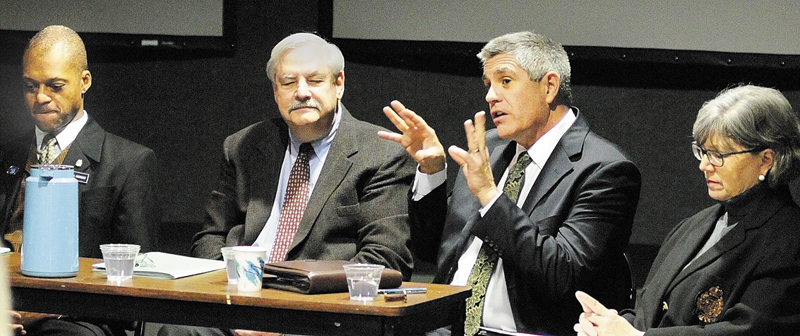AUGUSTA — While they disagreed about the role of government in addressing hunger, speakers at a discussion Wednesday at the University of Maine at Augusta said the state and local communities can do a lot to help.
Dean Lachance, executive director of Bread of Life Ministries, said demand at his organization’s kitchen and other emergency food providers has increased dramatically since the last economic recession began in 2007. Even so, he said, if someone is hungry in central Maine, food is available.
“I’m convinced as a community if we continue to share our abundance of food, then we can take care of the insecurity with food in our community,” Lachance said during the panel discussion.
“Food insecure” is the term the U.S. Department of Agriculture now uses instead of “hungry” to describe people who are not sure where they’ll get their next meal.
In 2011, Maine ranked second to Rhode Island in rate of food insecurity in New England: 14.7 percent of households, the same as the U.S. average. The number is even higher among children, 24 percent of whom were food insecure in 2010.
Mark Lapping, a professor of public policy and management at the University of Southern Maine, said such numbers should concern everyone because hungry children can’t concentrate in school, and diet-related diseases such as obesity are expensive to treat. Lapping said that when he was on dialysis because of kidney damage from Agent Orange, the care cost $250,000 per year, covered by his health insurance.
“If you don’t care about the people and you care only about your wallet, care about the fact that this is a disease that is growing incredibly rapidly in the U.S., certainly in the state of Maine, one of the most obese states,” he said.
Because hunger is so closely linked with poverty, Lapping said, the federal government could ease the problem by raising the minimum wage and focusing on creating jobs rather than reducing the national deficit.
Lachance said he thinks government isn’t necessarily the answer in this case.
Rep. Craig Hickman, D-Winthrop, said he believes in grass-roots solutions, and local food production has a major role to play.
“I have always believed that the most nourishing things come from the ground up,” Hickman said. “Local communities can solve the problems if local food producers and strong farmers are allowed to do what they need to do to make sure that our neighbors have access to healthy food.”
Hickman said more local production would push prices down, and some farmers probably would give food away, as he does as the owner of Annabessacook Farm in Winthrop.
New to the Legislature this year, Hickman has sponsored several food-related bills, including legislation to require edible landscaping in Capitol Park, require state-funded institutions to buy local food and reduce regulations on face-to-face transactions between farmers and consumers.
Lapping said Maine’s fields and fisheries have great capacity, but the state lacks slaughterhouses, food storage and processing facilities such as grain mills that are also hugely important.
Susan McMillan — 621-5645
smcmillan@mainetoday.com
Send questions/comments to the editors.



Success. Please wait for the page to reload. If the page does not reload within 5 seconds, please refresh the page.
Enter your email and password to access comments.
Hi, to comment on stories you must . This profile is in addition to your subscription and website login.
Already have a commenting profile? .
Invalid username/password.
Please check your email to confirm and complete your registration.
Only subscribers are eligible to post comments. Please subscribe or login first for digital access. Here’s why.
Use the form below to reset your password. When you've submitted your account email, we will send an email with a reset code.